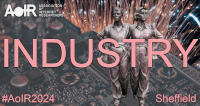TIKTOK’S AI HYPE - CREATORS’ ROLE IN SHAPING (PUBLIC) AI IMAGINARIES
DOI:
https://doi.org/10.5210/spir.v2024i0.14046Keywords:
imaginaries, artificial intelligence, influencers, social media platforms, TikTokAbstract
Artificial Intelligence (AI), often hailed as a transformative force, has become an ambivalent buzzword, simultaneously promising utopian possibilities and fueling dystopian anxieties. Social media platforms have emerged as pivotal spaces where the public narrative about AI takes shape, especially through content creators, significantly influencing our collective vision of the future with AI. Therefore, this paper inquires into the role of creators in shaping public imaginaries of AI through their AI content. The paper is based on TikTok as a site of entrance for investigating the role of creators in shaping ongoing discourses around AI through short video content. To understand the role of creators within this ongoing AI discourse, a hashtag network analysis is paired with a critical discourse analysis of creators’ AI content. The preliminary results show three dominant genres of AI content based on 1) AI tools output, especially visual content, 2) listicles on AI tools for different tasks, and 3) educational and critical AI content. Considering the creator types behind the content, a high amount of content is produced by content farms followed by tech TokTokers. Media outlets and commentary TikTokers dominate the third content section. Overall, four types of AI imaginaries are foregrounded. AI mystification envisions AI as fast-paced and inherently life-changing. Similarly, AI futuristic content makes AI out as inevitable. Contrastingly, a high AI pragmatism is prevalent in the ongoing tool discourse, while critical and educational content counteracts these imaginaries with a strong AI realism highlighting the complex and nuanced aspect of AI.Downloads
Published
2025-01-02
How to Cite
Richter, . V. (2025). TIKTOK’S AI HYPE - CREATORS’ ROLE IN SHAPING (PUBLIC) AI IMAGINARIES. AoIR Selected Papers of Internet Research. https://doi.org/10.5210/spir.v2024i0.14046
Issue
Section
Papers R

